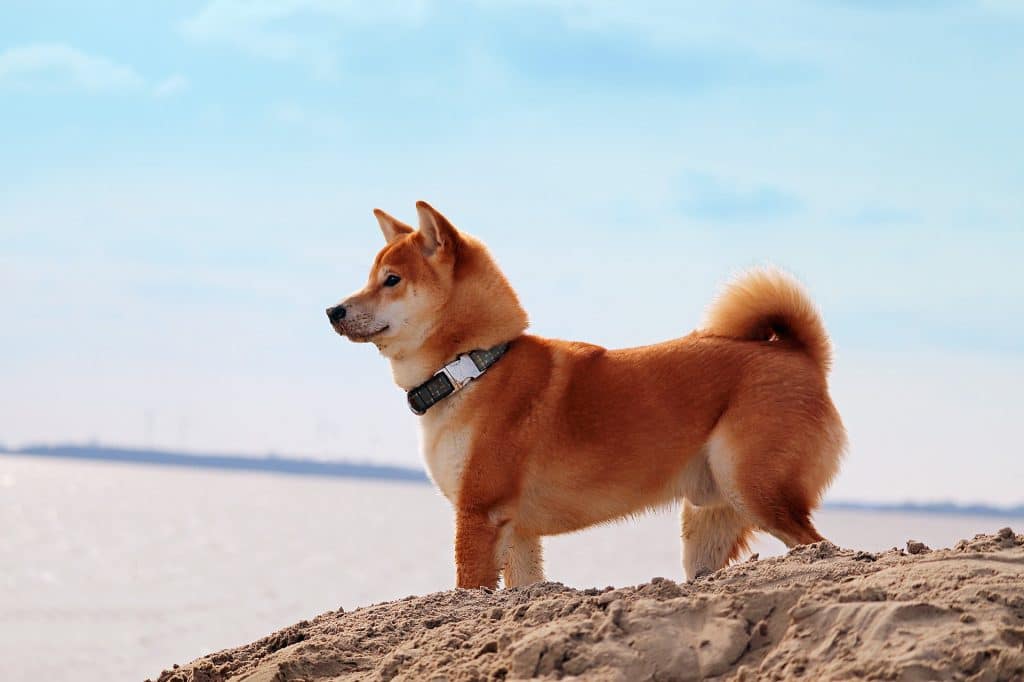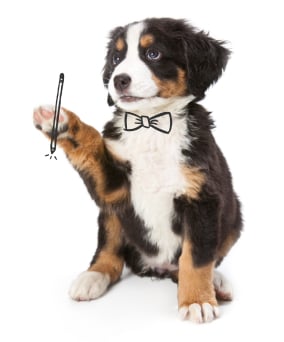
We know that big things can come in little packages, and that’s never been more true than with the bold, curious, and independent Shiba Inu. Though diminutive, this breed boasts plenty of wit and charisma, often winning people over with their stuffed animal-like looks and bright minds. However, this breed’s stubborn streak does require a firm, experienced hand, so they may not be the best pup for first-time dog owners. But when a Shiba Inu is well-trained and socialized, they will, without a doubt, make a wonderful companion and a fiery sidekick.
Is a Shiba Inu the right kind of dog for you? There are a lot of things to consider when adding a dog to your life, so we’ve covered just about everything you’ll need to know in this in-depth breed profile.
Breed Characteristics
Key
- Low
- Medium
- High
- Origin: Japan
- Size:
- Weight: 17-23 pounds
- Activity level:
- Barking/howling level:
- Good with cats:
- Shedding:
- Grooming level:
- Training level:
Shiba Inu Appearance
Often described as looking like a cuddly fox or teddy bear, the Shiba Inu has a unique and much-loved appearance. From the fluffy coat, to the prick ears and curly tail, it’s hard not to take notice of this pup’s good looks. Plus, they come in a small package, with most weighing only around 20 pounds, and generally not getting taller than 16.5 inches.
Their coat is of the double thick variety, and generally comes in orange-red, black and tan, sesame, and cream – though the orange-red is the most popular shade. You will sometimes see Shibas with white marking on the tip of their tail, and on their legs.
Shiba Inu Personality
These pups are no shrinking daisies, and in fact they’re known to have noticeably confident, curious personalities that set them apart from other breeds.
They’ve also been described as stubborn a time or two (or many) because of their high intelligence and their desire to do things their own way – even if it’s not necessarily what you’d like them to do. However, if you start training and socializing your Shiba Inu early on, you’re on your way to having a more adaptable, friendly pup.
That’s also important when it comes to your Shiba getting along with kids or other pets. This breed is known to be fiercely loyal and devoted to their families – which can definitely include children – but they need socialization early on, and children need to understand how to properly interact with dogs for things to run smoothly. Socialization can also help with their skepticism towards strangers, which is great when it comes to guarding your house, but less helpful when they’re suspicious of every visiting friend.
Another personality quirk to understand? This breed’s tendency to get possessive of their things (toys, food, territory, etc.). Sometimes that possessiveness can even lead to aggression, which is why these pups don’t work out for every household.
Ideal Environment for a Shiba Inu
Shiba Inus are happiest when they have room to roam and play, when means that a house with a nice, big yard where they can frolic is their ideal environment.
They also adore spending time with loved ones, and many will especially thrive when they’re the only pet in the household – meaning they get all the attention!
Ideal Human for a Shiba Inu
Shiba Inus are wonderful dogs, but it’s important that their human understand all of the quirks and perks of this particular breed. Though their adorable, teddy bear face is enticing to many, the ideal person for this pup is someone who has researched this breed, and truly understands what they need to be happy and healthy.
That someone should also be willing to put in the effort to train and socialize them, and give them the ample exercise they need everyday to be their best little Shiba selves – whether that’s a long walk, time in the yard, or other stimulating activities.
Shiba Inu Dog Training
As discussed earlier, Shiba Inus are strong-willed dogs, which is why training is so important, but also why it can be challenging. When training your Shiba, it’s essential that they believe they’re in charge, and that they’re benefiting from the situation.
You’ll need to spend time tackling their tendency to “resource guard” (when they get possessive about their toys and food), since that’s an issue that comes up regularly with this breed. It’s also important to work on restraint training for handling, and crate training. If all of that feels overwhelming, you can always hire a trainer who has experience with Shiba Inus to guide you through the process – in fact, for this breed that’s a wonderful idea.
We mentioned socialization earlier, and this is essential for this breed. Early on you should introduce your Shiba Inu to a variety of situations, people, animals, and locations. By showing them the world around them, and making them feel comfortable and safe with you as they explore it, they’ll gain the confidence to be the well-adjusted, well-behaved pup you know that they can be. Above all this breed really just wants to please their loved ones, and their smarts and charm mean that any effort you put into training them will be well worth it.
Shiba Inu Grooming
Despite their lovely coats, grooming is actually minimal for this breed since they are both naturally clean, and not very smelly. You should be in good shape as long as you brush them regularly to remove dead hairs and keep the coat healthy, and bathe them every three to four months. Just a heads up – they will blow their coat a couple of times a year, which means a dramatic increase in the hair clinging to every surface of your home.
Make sure you brush their teeth a few times a week as well, to keep their breath fresh and tartar buildup at bay. You’ll also need to trim their nails once or twice a month, if they aren’t worn down naturally by their wild romps outside.
Shiba Inu Health
Though Shiba Inus are usually healthy dogs, there are a few health issues that sometimes come up with this breed. These include various types of food and skin allergies, Chylothorax, epilepsy, Patellar luxation, and Hip dysplasia.
Shiba Inus generally live from 12 to 16 years, and with the proper exercise, food, and regular trips to the vet, your pup will have a good chance at a long and happy life.
Shiba Inu Breed History
The Shiba Inu is an ancient breed (they’ve been around since 300 b.c.), and were used to flush birds and small game for hunters in Japan. After World War II the breed almost went extinct, but luckily remaining Shibas were gathered from the countryside, and breeding programs were created to help the breed survive and flourish.
The first Shiba didn’t come to the United States until 1954, but since then they’ve continued to grow in popularity throughout the country.
Getting a Shiba Inu
Shiba Inu breeders
It’s always a good idea to meet the parents of your puppy, and to see how the litter interacts with each other. A good, trustworthy breeder should have records of the parents’ lineage, too and should be able to tell you more about the specific litter.
The American Kennel Club website is a great place to start your search for a reputable breeder. Make sure you wise up on puppy mills and internet scams—following some simple steps can help avoid further funding of this terrible practice, and help you end up with a pet whose breeding and early-life experience will more reliably result in a well-adjusted dog.
Adopting a Shiba Inu
Since Shiba Inus have such distinct personalities and temperaments, it’s important to make sure a particular pup is a good fit for you before adopting from a rescue organization. It’s also important to ask if they’ve done testing with food, toy, and human resource guarding so that you’re aware beforehand of any training your pup may need.
However, many surrendered dog will often already be well trained and simply in need of a new, loving home. You can find rescue centers local to you with a quick internet search. A Shiba Inu can make for a wonderful friend and they’re sure to be a source of joy, with plenty of laughs and perhaps a little bit of mischief along the way.
Whether you’re planning on adopting or finding a breeder to find a puppy, prepare yourself, your home and your heart to welcome a dog with plenty of personality and energy.
More on Shiba Inus
If you’re simply in love with Shiba Inus, then you’ll be craving what we’ve got for you next. From the most surprising facts about adopting Shiba Inus, to tips on how to groom them, to top names, funny Shiba sotries, and more:
- Breed Spotlight: All About the Shiba Inu
- Shiba Inu Puppies: The Ultimate Guide for New Dog Owners
- 15 Surprising Facts that Shiba Inu People Need You to Know
- Shiba Inu Grooming: Bathing, Shedding, And Why They Don’t Need Trims
- This Shiba Inu Runs His Own Sweet Potato Stand in Japan
- Top 120 Shiba Inu Names
